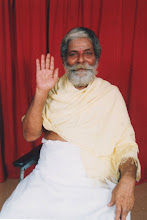Ajnashchcha ashraddhadhaanashchcha samshayaatmaa vinasyathi | Naayam
lokosti naparo nasukham samshayatmanah || 4.40 ||
Translation
The ignorant, the faithless, the doubting-self goes to destruction; there is
neither this world, nor the other, nor happiness for the doubter.
*
*
My understanding:
He who is ignorant and trapped in his own beliefs, can not understand what
really scripture tells, what really Spiritual Masters advices. He goes in
destruction without knowing to himself. No faith on anything or anybody. His
ego itself comes in his way as a block. For him, there will not be any world
other than his own world (Samsara). With this he cannot be liberated, thus
no happiness for the doubter. Until and unless he is free from his ego, he
cannot attain Mukti/Happiness.
*
Commentary by Chinmayananda Swami:
In the previous verse it was said that those who had faith and knowledge
would soon reach the Supreme Peace. In order to hammer this very same Truth
in, Krishna is here emphasising through a negative declaration that they,
who have NOT these qualities cultivated, gained and developed in them, will
get themselves ultimately destroyed and completely ruined. He who has
neither the "Knowledge-of-the-Self" --- if not a spiritual realisation, at
least a clear intellectual understanding --- nor "the intellectual readiness
to grapple with and fully understand the true import of the scriptural
declarations and the words of the Masters" (Shraddha), Krishna asserts, will
certainly get ruined, if he be also a 'doubting Thomas' (Samshaya-atma).
In the next line, Krishna, with all emphasis, condemns such men of endless
doubts, and points out their tragedy in life. The Lord says that such men
who "DOUBT THE SELF" will not find any joy or happiness ANYWHERE --- "
NEITHER HERE NOR IN THE HEREAFTER." In explaining thus, the Geeta seems to
express that there may be a small chance perhaps, for one who is devoid of
knowledge and faith to discover some kind of a happiness in this world, here
and now, but that those who are constant doubters can enjoy neither here nor
there. Such men are psychologically incapable of enjoying any situation,
because the doubting tendency in them will poison all their experiences. He
whose teeth have become septic must constantly poison the food that he is
taking; so too, those who have this tendency of doubting everything, will
never be able to accommodate themselves to any situation, however perfect
and just it might be. The line contains a spot of satire, almost vitriolic
in its pungency, when it is directed against the intelligent sceptic.





No comments:
Post a Comment